WMG News
University programme credited for helping West Midlands cut energy consumption by 32%
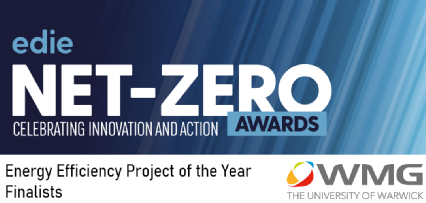 A university programme which helped SMEs reduce energy consumption by 32% has been nominated for a national sustainability award.
A university programme which helped SMEs reduce energy consumption by 32% has been nominated for a national sustainability award.
WMG at The University of Warwick helped more than 50 SMEs in the West Midlands become more sustainable after the energy crisis left 60% of these critical UK manufacturers threatened with closure. The project has helped reduce the energy and fuel consumption of SMEs, which are responsible for 44% of non-household UK emissions.
WMG achieved this through its Net Zero Innovation Network which is now up for ‘Energy Efficiency Project of the Year Award’ – hosted by edie’s Net Zero Awards.
The Net Zero Innovation Network is helping to deconstruct the complexities of energy management, sustainability, and innovation for manufacturers across the UK. The network of engineers, innovation managers and industry experts offers practical tools and programmes to help SMEs overcome barriers such as lack of time, internal skills and cash-flow to invest. There is no cost for businesses involved, the only investment needed from SMEs is time.
Net Zero Innovation Network also provides access to state-of-the art equipment at the University, help companies reduce their energy consumption. The programme, built on the key themes of people, planet and profit, gets under the skin of the business to empower them to make real lasting change – upskilling staff and reducing scope 1 and 2 emissions.
The Net Zero Innovation Network designed a Manufacturing Energy Toolkit to provide provide solutions for SMEs impacted by the energy crisis. This toolkit measured and analysed energy consumption at a granular level, using WMG systems and research. The average energy saving of businesses using the toolkit was 32% and one SME reduced its energy consumption by 81%.
Other successful Net Zero Innovation Network projects included:
- Waste heat recovery simulation – assessing how to redirect heat in businesses to avoid additional energy (heating) being used.
- Process automation – using robots or software to help automate more mundane, repetitive and simple tasks, enabling other staff members to focus on more impactful projects.
- Granular material and energy monitoring – mapping out what materials and energy is currently being used, identifying ways to enhance efficiency or reduce waste
- Digitalisation – encouraging companies to utilise digital tech and systems e.g. upgrading their processes from paper to online/digital
Laura Downey, Innovation Manager at WMG, and technical lead of the programme, said: “The Net Zero Innovation Network has supported over 50 businesses and counting. As a result, the businesses we’ve partnered with have reduced their emissions whilst improving profitability, remained suppliers of choice and increased material and energy efficiency. We are honoured to have been shortlisted for the edie Net Zero Awards and look forward to supporting even more SMEs on their journey to net zero.”
Leslie Sharp, Director of Kingfisher Enamelling, who benefited from the WMG programme, said: “WMG staff provide a range of knowledge and expertise which we just did not have. Added to this, their drive and commitment to help SMEs is immeasurable.”
The winners of edie’s Net Zero awards will be announced on 15 November. Find out more about the awards here https://event.edie.net/netzeroawards/3554235
For SMEs wanting to get involved in the scheme, there was a webinar on 26 October with a guest talk from participant company Professional Polishing Services https://warwick.ac.uk/fac/sci/wmg/mediacentre/wmgevents/nzinwebinaroct23
The Manufacturing Commission calls for greater support for businesses to navigate further education reforms and upskill their workforce for a digital future
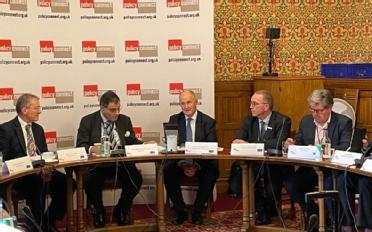 The Dean of WMG at the University of Warwick, Professor Robin Clark, spoke at the launch of Policy Connect’s new report on manufacturing skills this week (Wednesday 25th October). WMG supported the development of the report, including holding a roundtable with West Midlands employers; Higher Education (HE) and Further Education (FE) providers; and regional skills experts.
The Dean of WMG at the University of Warwick, Professor Robin Clark, spoke at the launch of Policy Connect’s new report on manufacturing skills this week (Wednesday 25th October). WMG supported the development of the report, including holding a roundtable with West Midlands employers; Higher Education (HE) and Further Education (FE) providers; and regional skills experts.
Lord Bilimoria of Chelsea CBE DL, launched Policy Connect’s latest report – Upskilling Industry: Manufacturing Productivity and Growth in England, alongside Minister for Enterprise and Markets, Keving Hollinrake MP; WMG Advisory Board member, Mark Pawsey MP and the Shadow Minister for Innovation, Chi Onwurah MP.
The Manufacturing Commission’s inquiry considers the implications of recent skills system reform in England on the manufacturing sector. It concludes that labour shortages are restricting productivity across the economy, with skills gaps in the manufacturing sector costing between £7.7 and £8.3 billion annually in lost economic output.
To address this the report recommends government make several reforms to the skills system:
· Support for SMEs in the manufacturing sector to help upskill their workforce, including incentives to deliver T-Levels and host skills boot camps.
· Greater flexibility in the use of the Apprenticeship Levy funds, including ring-fencing of unused Levy funding for investment in wider upskilling.
· A national campaign to increase the uptake of STEM subjects by women and people of minority ethnic backgrounds.
· Appointment of a government manufacturing ‘Champion’ to raise awareness of the manufacturing sector in schools and promote the role that the manufacturing sector is playing in combatting the climate crisis.
Inquiry Chair, Lord Bilimoria of Chelsea, CBE, DL said: “As Chair of the Manufacturing Commission and a proud supporter of British manufacturing, I am delighted to have been involved with this inquiry, which considers the impact of skills shortages across the sector.
“Throughout the evidence sessions that have informed this work, I have been inspired by accounts from manufacturing businesses that are using all levers available to them to upskill their workforces. The recommendations that we have made seek to help businesses, education providers, and individuals best navigate the current policy landscape and deliver the skills that the manufacturing sector so vitally needs.”
Inquiry Vice-Chair, and WMG advisory Board member, Mark Pawsey MP added: “As a member of the Business and Trade Committee and co-chair of the All-Party Parliamentary Manufacturing Group, I regularly hear of the skills shortages that limit productivity within the UK’s manufacturing sector. This inquiry explores how businesses can collaborate better with education providers to deliver the skills that local communities need. This is particularly important in the West Midlands, which is home to a significant part of the UK’s automotive and future battery technology capability.”
Professor Robin Clark, Dean of WMG, said: “The proposals in the report contain lots of good ideas on how to develop a system that really works for learners and employers, and suggests practical changes that can make a real difference to our skills system.
“The report is a call to action for all of us working in skills to encourage learners, course providers and employers to get engaged in manufacturing, give SMEs strong incentives to support skills and collaborate to improve course design, provision, and approval.
“We’ve got great examples of how skills can be transformative for businesses and students in manufacturing. Now we need to work together to make that the experience everyone has from our skills system.”
Read the full ‘Upskilling Industry’ report here: https://www.policyconnect.org.uk/research/upskilling-industry-manufacturing-productivity-and-growth-england
WMG research shapes the future of autonomous vehicles
WMG, at the University of Warwick, is part a unique £2 million consortium, entitled Sim4CAMSens.
 The Sim4CAMSens project, led by Claytex, is made up of a consortium of prominent industry partners, including AESIN, rFpro, Syselek, Oxford RF, National Physical Laboratory, Compound Semiconductor Applications Catapult and WMG.
The Sim4CAMSens project, led by Claytex, is made up of a consortium of prominent industry partners, including AESIN, rFpro, Syselek, Oxford RF, National Physical Laboratory, Compound Semiconductor Applications Catapult and WMG.
Together the consortium will create a framework for sensor evaluation that incorporates modelling, simulation, and actual testing. In order to enable Automated Driving Systems (ADS) and sensor developers to speed their development, this project will involve the development of new models for sensors, noise and materials, and new test methodologies.
The role of WMG will be to understand which noise factors have the higher impact on the different perception sensors (i.e., camera, LiDAR, RADAR,) and how to correlate virtual testing to real-life testing to support the entire supply chain.
Professor Valentina Donzella, who leads the Intelligent Vehicles Sensors research at WMG explains: “The Sim4CAMSens project is an extremely exciting opportunity for WMG, to work with UK based world leading industrial and research partners, to speed up the development of sensors models and testing methodologies. These are key considerations for the future safe deployment of robust and reliable ADS. The success of this project will ensure the UK leads the way globally in this field."
Find out more about WMG’s Intelligent Vehicles Sensors research here: https://warwick.ac.uk/fac/sci/wmg/research/cav/ivsensors
WMG with Solihull Council secure £300,000 for self-driving shuttle feasibility study
WMG at The University of Warwick, Solihull Council, National Highways, Transport for West Midlands, ZF, Aurrigo, Syselek and Liftango have successfully secured £300,000 to deliver a project looking into the feasibility of a self-driving shuttle service in the West Midlands.
The project will explore how a new automated transport link between Blythe Valley Business Park, near Shirley, and the new HS2 rail station in Solihull could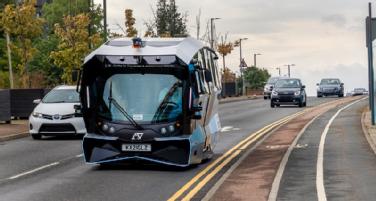 operate in the future. The feasibility study will consider all aspects of the technology required in order to provide a safe and reliable automated public transport service between these important commercial centres. The proposed route would use the existing road network travelling along the M42 from Junction 4 and utilise the new Junction 5a currently under construction.
operate in the future. The feasibility study will consider all aspects of the technology required in order to provide a safe and reliable automated public transport service between these important commercial centres. The proposed route would use the existing road network travelling along the M42 from Junction 4 and utilise the new Junction 5a currently under construction.
As a world-class research institution with leading capabilities in the verification and validation of safety assurance of self-driving technologies, WMG will apply its Operational Design Domain (ODD) based Safety Assurance research methodologies to the specific project challenges.
This project is part of the wider Midlands Future Mobility (MFM) initiative, led by WMG. The MFM vision is to achieve zero road incidents, net-zero emissions and inclusive transport in the West Midlands. MFM enables stakeholders from across mobility to address the interlinked challenges of technology, policy, and behaviour to realise the vision.
Cllr Ken Hawkins, Solihull Council Cabinet Member for Environment & Infrastructure, said: “Connected Automated Vehicle (CAV) technology has the potential revolutionise the way we get around our towns, cities and rural areas. Working with our partners we are excited to be undertaking this latest project.
“We’ve already carried out a series of successful pathfinder trials here in Solihull, using our own automated shuttle, and have led the way in showing how it is possible to practically and safely incorporate automated vehicles into our existing transport infrastructure. We are now taking the next step and undertaking the vital feasibility work necessary in order to start thinking about more ambitious deployments and establishing new commercial public transport services.
“The outcomes from the study are likely to inform self-driving mobility challenges not just here in Solihull but nationwide.”
Jonathan Smith, Midlands Future Mobility Programme Manager said: "The business case for scaling new mobility solutions is complex. It involves a granular understanding of the use case, safety, users, operations, and infrastructure. This project brings together a group of diverse experts to apply state of the art research and knowledge to address this question. Of critical importance is that the outcomes of this feasibility will inform mobility business cases both in the Midlands and the UK as a whole."
More information about this project
Partners: Solihull Metropolitan Borough Council (Lead), Aurrigo, Syselek (Uk) Ltd, Liftango Ltd, ZF Services UK Limited, West Midlands Combined Authority, Highways England, University of Warwick
Grant awarded: £300,000 (£197,664 from Centre for Connected and Autonomous Vehicles’ Commercialising Connected and Automated Mobility programme and balance is made up by the commercial partners).
Find out more about WMG’s Validation and Verification research here: Verification and Validation (warwick.ac.uk)
Note to editors
Media contact:
Annie Slinn
Communications Officer (Sciences)
Gabbie Lau
WMG Marketing and Communications Executive
WMG joins flagship electrification partnership
WMG at the University of Warwick, is part of a unique six-way partner collaborative research and development project led by Aston Martin.
Project ELEVATION has received £9m funding from the Advanced Propulsion Centre UK (APC) to supplement the research and development of Aston Martin’s in-house bespoke luxury battery electric vehicle platform.
Awarded following a competitive process, the government grant will support the development of Aston Martin’s luxury BEV platform and enable a route to net-zero, including investment in vehicle light weighting, a digital toolchain and electrification training.
Project ELEVATION is led by Aston Martin, and supported by the Manufacturing Technology Centre; Expert Tooling & Automation; Creative Composites; Fuzzy Logic Studio and WMG. The project will address the technical challenges of developing a lightweight, 800V traction battery pack and twin front electric drive unit (EDU) into a modular BEV platform with a bandwidth from supercar to SUV.
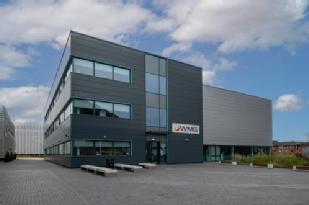 WMG’s role will focus on supporting the design, manufacture and life-cycle analysis (LCA) of the modular structural composite battery enclosure. Researchers in the composites group based in WMG's Materials Engineering Centre (MEC) will conduct materials evaluation and investigate automated high-volume composite manufacturing of hybrid structures using existing tooling and equipment to demonstrate attributes on early learning components. This knowledge will then be transferred to Creative Composites for manufacture of the project demonstrator components and provide LCA of the composite structure into the Manufacturing Technology Centre's holistic LCA model.
WMG’s role will focus on supporting the design, manufacture and life-cycle analysis (LCA) of the modular structural composite battery enclosure. Researchers in the composites group based in WMG's Materials Engineering Centre (MEC) will conduct materials evaluation and investigate automated high-volume composite manufacturing of hybrid structures using existing tooling and equipment to demonstrate attributes on early learning components. This knowledge will then be transferred to Creative Composites for manufacture of the project demonstrator components and provide LCA of the composite structure into the Manufacturing Technology Centre's holistic LCA model.
Roberto Fedeli, Group Chief Technology Officer of Aston Martin, said: “The award of funding from the APC is another major boost to our electrification strategy and constant strive for innovation. Providing further resources to explore the possibilities of our bespoke BEV platform, it will help achieve our ambition to be an in-house BEV technology leader in the ultra-luxury, high-performance segment. We look forward to progressing this project with our collaborative partners and thank the APC for their incredible support.”
Ian Constance, APC Chief Executive, said: “The 23rd round of our collaborative R&D competition coincides with the APC’s 10th anniversary. We’ve seen over £1.4 billion of investment into automotive projects since the APC was set up, and I am proud of the impact that we have made here in the UK. This latest announcement includes a diverse set of OEMs and suppliers that demonstrate the strength of UK automotive. They will further add to our portfolio of innovative projects and continue to drive the UK to deliver on its net zero ambition.”
Find out more about WMG’s composite light-weighting research here https://warwick.ac.uk/fac/sci/wmg/research/materials/acrc
WMG charges ahead with battery research
WMG, at the University of Warwick, has received a share of £19 million from the Faraday Institution - the UK’s flagship institute for electrochemical energy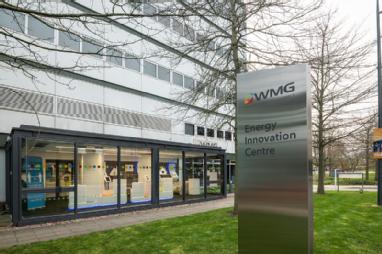 storage research.
storage research.
The funding has been allocated to four key battery research projects aimed at delivering an impact for the UK. These existing projects across three different research areas — next generation cathode materials, electrode manufacturing and sodium-ion batteries — have been reshaped to focus on the areas with the greatest potential for success.
WMG is taking a key role in two of the four, reshaped projects entitled FutureCAT and Nextrode.
WMG’s Professor of Battery Innovation, Louis Piper, will now co-lead FutureCAT, a battery cathode research project, focusing on understanding novel redox processes as a route to stabilise both high capacity, high performance, nickel rich and emerging cathodes and scalable designer morphologies. The project will build on its success in developing reliable, scalable routes to deliver a longer lifetime, high-energy/power cathodes, essential for electric vehicles.
Whereas in Nextrode, a battery electrode project, WMG is one of six university partners, led by the University of Oxford, alongside six industry partners. Researchers at WMG will investigate ways to make electrodes for Li-ion batteries unlocking the electrochemical potential.
Professor Pam Thomas, CEO, Faraday Institution, commented: “The Faraday Institution remains steadfast in its commitment to identify and invest in battery research initiatives that hold the greatest potential for making significant societal, environmental, and commercial contributions. This announcement signals the completion of our latest round of project refocusing, enabling us to allocate even more effort towards those areas of research that offer maximum potential in delivering transformative impact.”
James Gaade, Research Programme Director commented: “We are pleased that the reshaping process has bolstered the capabilities and expertise of researchers on the four projects. The realignment includes a focus around research into sustainable manufacturing methods and materials, and the need to further develop and scale up manufacture of promising materials discovered in the first three years of the projects.”
Project information
FutureCat – High nickel content, high performance cathode materialsLink opens in a new window
FutureCat, co-lead by WMG’s Professor Louis Piper, and the University of Sheffield’s Professor Serena Cussen is targeting step-changes in:
- Understanding novel redox processes as a route to stabilise both high capacity, high performance, nickel rich and emerging cathodes. The project continues its focus on doped and dual-doped lithium nickel oxides (LNO) (both polycrystalline and single crystals), including use of protective coatings. The team will also investigate the use of polyanionic cathodes, use modelling to inform the search for new candidate materials, and research designer electrolytes with the intention of stabilising the interphase layer.
- Scalable designer morphologies. The project will build on its success with doped-LNO in developing reliable, scalable routes to deliver a longer lifetime, high-energy/power cathodes through the use of gradient morphologies, co-doped cathodes (with the aim of delivering reversible discharge capacities exceeding 220 mAh/g), single crystal particles and thin coatings.
- Materials delivery: The scale up of the high nickel W-LNO material previously developed by FutureCat is being transferred to the Degradation project for testing in industry-relevant pouch cells. FutureCat will continue to investigate the manufacturing scale-up of other Ni-rich cathode materials, down-selecting promising active materials based on earth-abundant elements. Research includes the use of laser patterning to increase power densities, investigation of cracking as a failure mechanism to determine routes to resilient cathode manufacture, atomic layer deposition of coatings to improve electrode longevity, and optimisation of cycle life through the use of electrically conductive binders.
Nextrode – electrode manufacturingLink opens in a new window
Nextrode is focused on researching, understanding and quantifying the potential of smart electrode manufacturing to reduce manufacturing costs and improve the performance of batteries. Benefits could be realised in both mature material systems already used commercially and in new emerging high performance battery systems. The project is developing new practical manufacturing innovations – including traditional slurry cast electrodes and novel low or no solvent electrodes – that could deliver the benefits of smart electrodes to the industrial scale and improve sustainability of processes.
The project is researching the underpinning manufacturing science that could alleviate constraints in electrode manufacturing through engineering particle design and improved understanding of the relationship between powder properties and deposition/calendering techniques. Nextrode is designing manufacturing process steps and using advanced in-line measurements to enable slurry casting to be brought under closed-loop control. Researchers are manufacturing new arrangements of anode and cathode materials, identifying conditions where benefits are maximised and developing cells that expand the energy-power-lifetime design space.
The new phase of research projects described will progress over the two years from 1 October 2023 to 30 September 2025.
Find out more about WMG’s Electrochemical Engineering research here: Electrochemical Materials (warwick.ac.uk)
For more information on the Faraday Institution, visit www.faraday.ac.ukLink opens in a new window
Bhattacharyya Award finalists “inspiring and diverse examples” of innovative and impactful partnerships between industry and universities
· Improved footballs for use in the World Cup and new technologies for defence against biological and chemical attack are examples of outcomes from six industry–academia partnerships shortlisted for this year’s annual Bhattacharyya Award
· Winning partnership will be announced at awards ceremony in Birmingham on 24 October 2023
The Royal Academy of Engineering has shortlisted six exceptional industry–academia partnerships from across the UK for this year’s Bhattacharyya Award.
The Bhattacharyya Award 2023 and a cash prize of £25,000 will be presented on 24 October 2023 to the team who best demonstrate how industry and universities can work together.
The Bhattacharyya Award is a tribute to Professor Lord Kumar Bhattacharyya KT CBE FREng FRS, the Regius Professor of Manufacturing at the University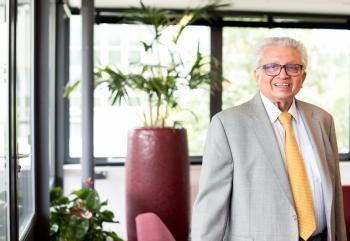 of Warwick and founder of WMG who advocated for greater collaboration between industry and universities. Funded by the Department for Science, Innovation and Technology, the annual Bhattacharyya Award is open to UK universities and colleges that have demonstrated a sustained, strategic industrial partnership that has benefitted society and is deserving of national recognition. Industry–academia partnerships from any academic discipline are eligible for the Bhattacharyya Award.
of Warwick and founder of WMG who advocated for greater collaboration between industry and universities. Funded by the Department for Science, Innovation and Technology, the annual Bhattacharyya Award is open to UK universities and colleges that have demonstrated a sustained, strategic industrial partnership that has benefitted society and is deserving of national recognition. Industry–academia partnerships from any academic discipline are eligible for the Bhattacharyya Award.
This year’s shortlist illustrates the sheer diversity of challenges that can be successfully addressed through collaboration between universities and industry, including national defence against biological and chemical attack, the supply of drinking water, nuclear decommissioning, high-speed global communications, high-performance sportswear and equipment, as well as other challenges like decarbonisation that can be tackled through the power of process systems engineering.
The full shortlist of finalists is as follows:
University of Hertfordshire and the Defence Science and Technology Laboratory (Dstl)
New technologies for defence against biological and chemical threats
The collaboration between the University of Hertfordshire and the Defence Science and Technology Laboratory (Dstl) is focused on next generation devices and systems for monitoring and identifying biological and chemical threats. The collaboration aligns with the University of Hertfordshire’s objectives to stimulate enterprise and innovation, taking a pioneering approach to the transfer of knowledge from academic research to business and government. For Dstl, the collaboration has been central to its mission to explore, sustain, grow and evaluate state-of-the-art technological capabilities to develop protective measures against hazardous biological materials.
Imperial College London, UCL and the Sargent Centre Industrial Consortium
Unleashing the power of process systems engineering research
The Sargent Centre is the world’s largest multidisciplinary research centre in Process Systems Engineering, combining a deep understanding of chemical and biochemical processes with the ability to make fundamental advances across a wide range of systems and digital technologies for the benefit of society and industry. Bringing fundamental research advances to practice is deeply embedded in the Sargent Centre’s approach. For over 30 years, Sargent Centre researchers and process industry partners (e.g., ABB, BP, Eli Lilly and Company, Petronas, Pfizer, Procter and Gamble, Siemens, Shell, Syngenta) have collaborated to address challenges in manufacturing, decarbonisation, energy efficiency, optimisation, data science, multi-scale modelling, risk and uncertainty. This has resulted in successful spin-out creation and software licensing, with tools used across the pharmaceutical, agrochemical, consumer goods, food and energy sectors.
Loughborough University and adidas
Sports equipment and clothes for improved performance, safety and inclusivity
Since 2002, the Loughborough University and adidas cross-disciplinary teams have advanced engineering knowledge that has brought iconic products to market and been translated beyond the global sports sector for wider societal impact, making sport safer, more accessible and allowing people to perform at their best whilst developing the adidas talent pipeline.
The collaborative research has influenced all adidas major tournament footballs since 2004, and the analysis of short duration collisions in football has benefited other sports including new International Standards for cricket helmet performance that have eliminated facial injuries among professional helmeted batters. Another innovation is the first-ever sweat body maps of males, females and children to inform the company’s sector-leading clima® product range. This breakthrough underpins the first virtual Human Thermal Model which enables organisations worldwide to optimise product design for multiple populations across a range of industry sectors.
University of Sheffield and the UK water sector
Keeping drinking water crystal clear
Ageing infrastructure and the complexity of interacting physical, chemical and biological processes occurring within the vast hidden water distribution systems leads to discolouration, an indicator of water quality deterioration, and the number one service contact by consumers. Over the last two decades, by combining world-leading knowledge with a fundamental understanding of the processes and delivery of practical tools and techniques, the University of Sheffield has built the ‘Prediction and management Of Discolouration in Distribution Systems’ (PODDS) consortium across the UK water sector to address these challenges. This innovative partnership has helped the sector achieve improved levels of service without increasing costs, delivering more than 35% reduction in customer contacts regarding water discolouration and increased operational efficiency through better targeting of limited resources.
UCL Optical Networks Group and worldwide telecommunications industry
High-speed ultrawideband and low-delay optical communications networks for the cloud
Optical fibre communication networks underpin global communications, carrying over 95% of all digital data. The work of the Optical Networks Group has been key to the development of this critical high-capacity, low-delay, resilient and secure communications infrastructure. By deeply embedding their industrial collaborators within the group's research, the group has achieved society-wide impact, including a 100,000-fold increase in optical network data capacity, the doubling of transmission distances, and world record data rates, using its one-of-a-kind laboratories and expertise. Since the group was founded in 1994, it has become the centre of a web of over 60 leading international industrial laboratories and companies, across all telecommunications sectors: network operators and content providers (e.g., BT, Deutsche Telecom, Microsoft, KDDI), equipment and device manufacturers (Oclaro (now Lumentum), Nokia Bell Labs, Xtera, ADVA, Mitsubishi, Infinera) and optical fibre manufacturers (Corning, OFS).
University of Manchester and Nuclear Decommissioning sector
Providing expertise for quicker, safer nuclear decommissioning
The UK has been a nuclear nation for 75 years and has accumulated one of the largest. most complex nuclear legacies on Earth. Since 2002, Government has focused on cleaning up this legacy, a programme of work that will last over 100 years and cost over £140 billion. The Dalton Nuclear Institute coordinates the UK’s most comprehensive nuclear academic community, at The University of Manchester, to deliver skilled people, impactful research and support for Government policy development. The Institute’s research has, among other beneficial impacts, led to changes in effluent treatment at Sellafield and reduced discharges to the environment by 50-90%. The team have also developed robots for high hazard settings, including one of Time Magazine’s 200 best innovations for 2022; and improved the management of the UK’s separated plutonium stockpile. In a sector with a critical shortage of experts, the Institute also provides a vital pipeline of talent.
View the videos of the shortlisted partnerships.
Professor Dame Ann Dowling OM DBE FREng FRS, former President of the Royal Academy of Engineering and Chair of the judging panel for the Bhattacharyya Award, said: “The six finalists for this year’s Award are inspiring and diverse examples of successful collaboration between academia and industry—it’s terrific to be able to highlight and to celebrate their innovation and impact and I hope they will provide inspiration for others. We know that there are other great partnerships like these between universities and colleges and industries across the UK in all sectors but that we need many more if we are to fully reap the economic and societal benefit of our research investment and capability.”
The winner of the Bhattacharyya Award will be announced on the evening of 24 October 2023 at a ceremony at the Edgbaston Park Hotel in Birmingham that will showcase the shortlisted partnerships. Anyone wishing to attend should contact awards@raeng.org.uk for more details.
Notes for editors
- WMG, University of Warwick, is a world leading research and education group, transforming organisations and driving innovation through a unique combination of collaborative research and development, and pioneering education programmes. As an international role model for successful partnerships between academia and the private and public sectors, WMG develops advancements nationally and globally, in applied science, technology and engineering, to deliver real impact to economic growth, society and the environment.
- The Royal Academy of Engineering is harnessing the power of engineering to build a sustainable society and an inclusive economy that works for everyone. In collaboration with our Fellows and partners, we’re growing talent and developing skills for the future, driving innovation and building global partnerships, and influencing policy and engaging the public. Together we’re working to tackle the greatest challenges of our age.
Media enquiries to: Pippa Cox at the Royal Academy of Engineering Tel. +44 207 766 0745; email: Pippa.Cox@raeng.org.uk
WMG and Wayve received substantial government funding to research and develop AI safety in self-driving vehicles
- WMG at the University of Warwick and leading self-driving technology developer Wayve have received £1.9 million in government funding to lead a research project on AI safety in self-driving vehicles
- This pioneering project, DriveSafeAI, aims to develop scalable methodologies and mechanisms to prove that the use of AI is safe for self-driving vehicles, which national and international self-driving vehicle developers can adapt the findings to their technology developments
- The project supports the UK government’s ambition to make the UK the leader in AI and its vision of deploying self-driving vehicles in 2025
WMG at the University of Warwick and leading self-driving vehicle technology developer Wayve have been awarded £1.9 million to undertake research to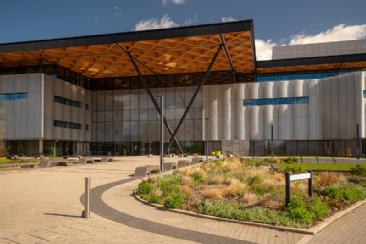 ensure the safe use of AI in self-driving vehicles.
ensure the safe use of AI in self-driving vehicles.
This project, DriveSafeAI, is taking the initiative to research and develop scalable mechanisms and methodologies to prove that AI is safe to use in self-driving vehicles. WMG is a world-class research institution with internationally recognised research capabilities in safety assurance of self-driving technologies, combined with Wavye’s expertise in developing end-to-end machine learning for self-driving, a set of evidence- and data-based methods and tools will be developed and made available for global self-driving developers to test their technologies. The research result will help shape the UK's policy and regulatory framework for AI in the future.
Self-driving vehicles can potentially bring £42 billion in economic benefits to the UK. Proving the safety of AI is a crucial step to unlocking this huge market. However, currently, there is no internationally or nationally agreed methodology in place to prove AI is safe to use in self-driving technologies, which hinders the commercialisation of self-driving vehicles. Therefore, this project will create a solution for AI safety assurance and develop societal trust in AI and self-driving technology.
More information about the DriveSafeAI project and the funding
DriveSafeAI is part of CCAV’s Commercialising CAM Supply Chain Competition (CCAMSC).
The Commercialising CAM programme is funded by the Centre for Connected and Automated Vehicles, a joint unit between the Department for Business and Trade (DBT) and the Department for Transport (DfT) and delivered in partnership with Innovate UK and Zenzic.
The £18.5m CCAMSC competition was launched in October 2022 to support the deployment of self-driving vehicles, by strengthening the capabilities of the sovereign UK CAM supply chain and is part of the Government’s vision for self-driving vehicles. Connected and automated mobility 2025: realising the benefits of self-driving vehicles.
Alex Kendall, CEO and Co-founder of Wayve, said: "At Wayve we know that confidence in our technology is crucial to commercialisation and widespread adoption of self-driving vehicles. Leveraging AI, we have the chance to bring the benefits of self-driving vehicles to everyone’s door. But first, securing trust in AI is paramount.
"That’s why we’ve been working closely with government and academia to ensure the methodologies we use to evidence safety are clear and trustworthy. Today, we’re excited to announce a formal partnership with WMG, University of Warwick, global leaders in the safety of artificial intelligence and autonomous systems. DriveSafeAI will give the public and policymakers confidence in this technology, which has the potential to revolutionise transport."
 Professor Siddartha Khastgir, Head of Verification & Validation at WMG, University of Warwick, said: "AI – and particularly embodied AI – like self-driving vehicles, is one of the biggest topics currently discussed in society. Deploying this technology safely is essential to realising the huge opportunity AI can offer society.”
Professor Siddartha Khastgir, Head of Verification & Validation at WMG, University of Warwick, said: "AI – and particularly embodied AI – like self-driving vehicles, is one of the biggest topics currently discussed in society. Deploying this technology safely is essential to realising the huge opportunity AI can offer society.”
“At WMG, through DriveSafeAI we are excited to be partnering with Wayve, a leader in self-driving vehicle technology, to help shape the safe AI landscape in the UK and globally.”
“We believe the safety of this technology needs to be proven collaboratively, in a scalable manner and that future policy should have strong research foundations."
Note to editors
About Wayve
Wayve is on a mission to reimagine autonomous mobility through embodied intelligence. Founded in 2017, Wayve is made up of a global team of experts in machine learning and robotics from top organisations around the world. We were the first to deploy autonomous vehicles on public roads with end-to-end deep learning, pioneering the AI software, lean hardware, and fleet learning platform for AV2.0: a next-generation autonomous driving system that can quickly and safely adapt to new driving domains anywhere in the world.
Wayve has raised over $258M and is backed by Eclipse Ventures, D1 Capital Partners, Baillie Gifford, Moore Strategic Ventures, Balderton Capital, Virgin, and Ocado Group. The team is based in London and California, with a fleet of vehicles testing in cities across the UK. Wayve aims to be the first to deploy autonomy in 100 cities. To learn more, visit www.wayve.ai.
WMG secures funding for two new knowledge transfer partnerships with SME manufacturers pushing the boundaries on process and management innovation
The SME Group at WMG, University of Warwick, has embarked on two major projects with Bellagio Stone and Radius Systems thanks to over £200k in funding from Innovate UK’s Knowledge Transfer Partnership (KTP) scheme.
funding from Innovate UK’s Knowledge Transfer Partnership (KTP) scheme.
A KTP is a three-way collaboration between a company, an academic institution (in this case WMG at the University of Warwick) and a graduate or postgraduate. KTPs are designed to help businesses improve their competitiveness and productivity through shared knowledge, technology, and skills.
Bellagio Stone’s two-year project will create a new cultural management and leadership framework within the business following a recent merger, enabling it to push productivity and prepare for future expansion. Bellagio will transform its operations in the stonemasonry industry, capitalising on a range of long-term growth ambitions.
Radius Systems manufacturers of innovative plastic pipeline solutions will work on a two-year project with WMG to analyse, design and implement a process control system to reduce process variation in the continuous manufacture of water, gas and hydrogen infrastructure pipes.
Simon Broome, Innovation Manager at WMG who works with SMEs to secure KTP funding said: “We are delighted to announce these major new KTP projects. Both Bellagio Stone and Radius Systems have showed a fantastic appetite to grow their businesses and engage with the University to achieve their goals. We are excited about the potential ahead and are now in the process of recruiting the KTP Associates who will deliver the projects in the businesses.”
Mike Boyden, Operations Director at Bellagio Stone Ltd said: “We are really excited to have been awarded the funding to begin the KTP project in conjunction with WMG. We have worked on a number of really successful projects with WMG in the past and feel the KTP has great potential to help develop our business further. Having recently completed a business merger, this targeted approach of supporting specific hurdles we are facing, will help unite both businesses and really drive improvements in productivity, purchasing power and overall efficiencies. We are really grateful to all the team involved with supporting the application and look forward to getting started.”
Allen Clarke Technical Director at Radius Systems Ltd said: “We are delighted to be awarded the funding through Innovate UK and the opportunity to further work with WMG. We have many ideas and initiative to further enhance our manufacturing processes and drive or business to the next level. The scheme will give us great insight into our chosen technical subjects whilst enhancing our World class manufacturing and Industry 4.0 philosophy. Thank you to all involved with this venture and looking forward to getting started in Autumn 2023.”
Find out more about WMG’s SME programmes here: WMG SME Group | How can we help you? (warwick.ac.uk)
Project workshop addresses cyber-security in connected and autonomous mobility
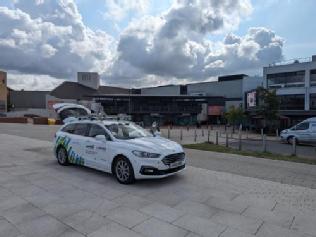 Researchers from WMG, at the University of Warwick, were pleased to welcome partners and guests to a live trial and project workshop on the AirQKD project.
Researchers from WMG, at the University of Warwick, were pleased to welcome partners and guests to a live trial and project workshop on the AirQKD project.
AirQKD addresses the cyber security of Connected and Autonomous Vehicles (CAV) and specifically addresses components, manufacturing, software, and testing for last-mile Quantum Key Distribution (QKD) systems between shared parties for 5G and connected cars.
It is an Innovate UK funded collaboration between BT; Lexden Technologies; OLC; Duality, Bristol University; Fraunhofer Centre for Applied Photonics; Strathclyde University; WMG; Bay Photonics; Heriot Watt University; Angoka; ArQit; Nu Quantum; National Physical Laboratory; CSA Catapult and Edinburgh University.
The trial combines BT’s expertise in building quantum-secure networks using QKD – an essentially un-hackable, cutting-edge technique for sharing encryption ‘keys’ between locations using a stream of single photons) with other new techniques for applying quantum security to mobile devices, developed by UK start-ups Nu Quantum, Angoka and Duality.
On the University of Warwick campus, as part of the Midlands Future Mobility testbed, WMG has created a Vehicle to Infrastructure (V2I) testing facility enabling AirQKD partners’ technology in key management, key consumption, and security protocols to be used for secure communications.
The AirQKD system implements Free Space Optics (FSO) cryptographic key generation and standards-compliant key management. WMG is now managing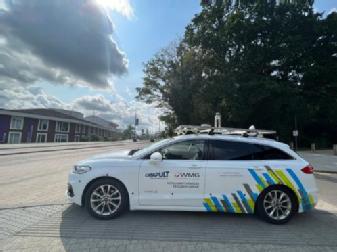 the workstream between telecommunications (4G/5G cellular at BT’s Adastral Park site) and V2I communications on the University of Warwick campus. In combination, these technologies will be used to deliver an ultra-secure link between connected 5G towers and mobile devices, as well as to connected cars.
the workstream between telecommunications (4G/5G cellular at BT’s Adastral Park site) and V2I communications on the University of Warwick campus. In combination, these technologies will be used to deliver an ultra-secure link between connected 5G towers and mobile devices, as well as to connected cars.
Find out more about CAV research at WMG here: https://warwick.ac.uk/fac/sci/wmg/research/cav/connectivity/
Read more about AirQKD here: https://warwick.ac.uk/fac/sci/wmg/research/transformation/securecybersystems/projects
